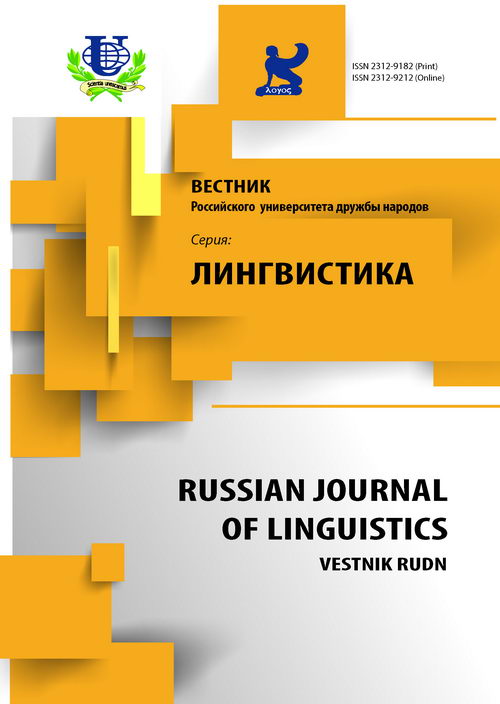Intercultural Communication as a Situated, Culturally Complex, Interactional Achievement
- Authors: Carbaugh D.1
-
Affiliations:
- University of Massachusetts
- Issue: Vol 19, No 4 (2015)
- Pages: 33-42
- Section: Articles
- URL: https://journals.rudn.ru/linguistics/article/view/9255
- ID: 9255
Cite item
Full Text
Abstract
The field of intercultural communication includes a variety of productive theoretical approaches as well as different methodological commitments. Some studies are built on the basis of self-report measures, aggregate tendencies, and/or resulting scores within and across national populations. This article focuses on a different kind of empirical study that is based upon careful observations of actual intercultural interactions and interpretations which honor the participants’ views of those interactions. The article first diagrams the process of intercultural communication as a situated, cultural accomplishment. Next, distinct and complementary modes of analyses for phases of such study are presented. Finally, specific goals and eventual insights are discussed.
About the authors
Donal Carbaugh
University of Massachusetts
Email: carbaugh@comm.umass.edu
Department of Communication
References
- Berry, Michael. (2009). The social and cultural realization of diversity: an interview with Donal Carbaugh. Language and Intercultural Communication, 9, 230-241.
- Carbaugh, Donal. (1990). The critical voice in ethnography of communication research. Research on Language & Social Interaction, 23(1-4), 261-281.
- Carbaugh, Donal. (1993). Cultural pragmatics and intercultural competence. The competent intercultural communicator: AFinLA Yearbook, 117-129.
- Carbaugh, Donal. (2005). Cultures in Conversation. Mahwah, NJ & London: Lawrence Erlbaum Publishers.
- Carbaugh, Donal. (2007). From cognitive dichotomies to cultural discourses: Hofstede, Fougere and Moulettes in conversation. Journal of Multicultural Discourses, 2, 20-25.
- Carbaugh, Donal. (2015). Reporting cultures on 60 Minutes: Missing the Finnish line. Routledge.
- Carbaugh, Donal and David Boromisza-Habashi. (2015). Ethnography of communication. International Encyclopedia of Language and Social Interaction Blackwell. 537-552.
- Carbaugh, Donal and Tovar Cerulli. (2013). Cultural Discourses of Dwelling: Investigating Environmental Communication as a Place-based Practice. Environmental Communication: The Journal of Nature and Culture 7 (1), 2013, 4-23.
- Carbaugh, Donal, Molina-Markham, Elizabeth, Nuciforo, Elena, & van Over, Brion. (2011). Discursive reflexivity in the ethnography of communication: Cultural discourse analysis. Cultural Studies Critical Methodologies, 11, 153-164.
- Carbaugh, Donal, Nuciforo, Elena, Saito, Makoto, & Dong-Shin, Dong. (2011). Cultural discourses of “dialogue”: The cases of Japanese, Korean and Russian. Journal of International and Intercultural Communication, 4, 87-108.
- Chen, Victoria. (1990/1991). “Mien tze” at the Chinese dinner table: A Study of the Interactional Accomplishment of Face. Research on Language and Social Interaction, 24, 109-140.
- Covarrubias, Patricia. (2008). Masked silence sequences: Hearing discrimination in the college classroom. Communication, Culture& Critique, 1, 227-252.
- Hall, Bradford “J”. (1994). Understanding intercultural conflict through an analysis of kernel images and rhetorical visions. International Journal of Conflict Management, 5, 62-86.
- Hymes, Dell. (1972). Models of the interaction of language and social life. In J. Gumperz and Dell Hymes (eds.), Directions in sociolinguistics: The ethnography of communication (pp. 35-71). New York: Holt, Rinehart and Winston.
- Katriel, Tamar. (2004). Dialogic moments: From soul talks to talk radio in Israeli culture. Detroit, MI: Wayne State University Press.
- Klyukanov, Igor and Olga Leontovich. (in press). Russian perspectives on communication. In D. Carbaugh (ed.), Handbook of Communication in Cross-cultural Perspective (International Communication Association Series). Routledge.
- Philipsen, Gerry, Coutu, Lisa M., & Covarrubias, Patricia. (2005). Speech codes theory: Restatement, revisions, and response to criticisms. In W. Gudykunst (ed.), Theorizing about intercultural communication Sage. 55-68.
- Witteborn, S. (2010). The role of transnational NGOs in promoting global citizenship and globalizing communication practices. Language and intercultural communication, 10(4), 358-372.
Supplementary files















